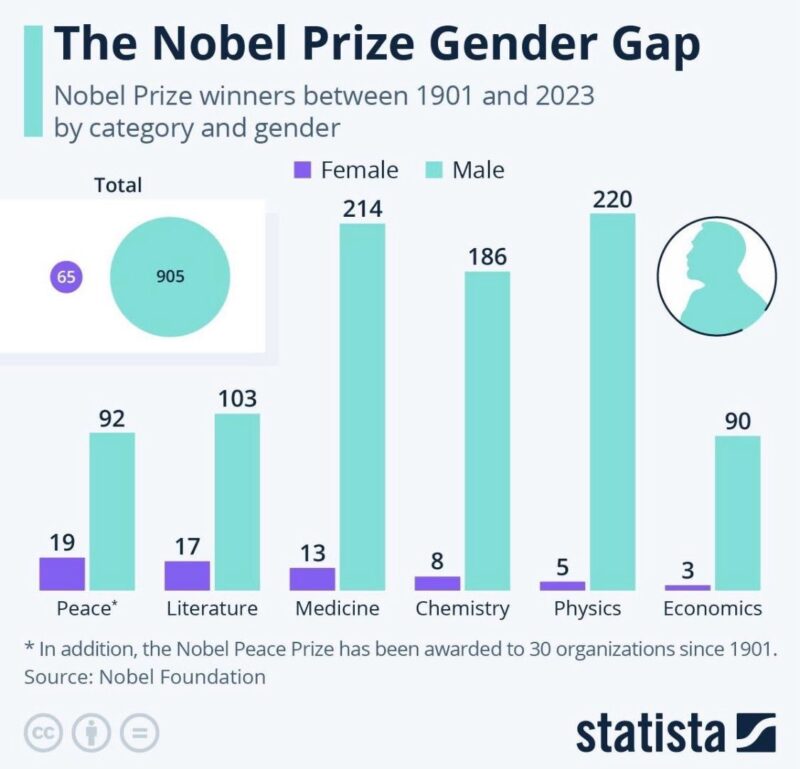
Rahaf Ajaj: The Persistent Gender Gap in Nobel Prizes – A Call for Greater Inclusion
Rahaf Ajaj, Associate Professor at Abu Dhabi University, shared on LinkedIn:
”The Persistent Gender Gap in Nobel Prizes: A Call for Greater Inclusion
As the 2025 Nobel Prize announcements wrap up (with the Economic Sciences prize forthcoming), it’s a timely moment to reflect on the historical gender disparity in these esteemed awards.
While we celebrate the groundbreaking achievements of this year’s laureates, the data reveals a stark imbalance that underscores the need for continued efforts toward equity in academia, science, and global leadership.
From 1901 to 2025, only 67 women have received Nobel Prizes across all categories.
In comparison, men have dominated, with over 900 male laureates during the same period—highlighting a ratio where women represent less than 7% of individual winners.
Breaking it down by category (updated from the attached Statista infographic, which covers up to 2023):
• Peace: 20 women (including María Corina Machado in 2025 for her advocacy in Venezuela) 21 vs. approximately 92 men, plus 30 organizations.
• Literature: 18 women (including Han Kang in 2024 for her poignant prose) 21 vs. 103 men.
• Medicine/Physiology: 14 women (including Mary E. Brunkow in 2025 for discoveries in immune tolerance) 21 vs. around 186 men.
• Chemistry: 8 women vs. about 186 men.
• Physics: 5 women vs. roughly 220 men.
• Economics: 3 women vs. 90 men.
This distribution shows modest progress in recent years—2023 saw four female winners, 2024 one, and 2025 two so far—but the gap is particularly pronounced in STEM fields like Physics, Chemistry, and Economics, where systemic barriers, underrepresentation in research pipelines, and nomination biases continue to play a role.
As professionals in our respective fields, we must champion initiatives that amplify women’s contributions, from mentorship programs to equitable funding and recognition.
Closing this gap isn’t just about fairness; it’s about harnessing the full spectrum of human talent to drive innovation and societal progress.
What steps do you think organizations and institutions
should take to address this?
I’d love to hear your insights in the comments.”

Stay updated with Hemostasis Today.
-
Feb 23, 2026, 18:13Fight4Hematology Supports Research and Empowers the Next Generation – ASH
-
Feb 23, 2026, 17:59Wolfgang Miesbach: Real-World Evidence of Emicizumab on Joint Outcomes in Hemophilia A
-
Feb 23, 2026, 17:56Shiny K Kajal: The Transfusion Reaction We Often Miss
-
Feb 23, 2026, 17:53Radheshyam Meher: Contributing to the Transfusion Evidence Round-Up for International Childhood Cancer Day 2026
-
Feb 23, 2026, 17:46Mahesan Subramaniam: The Physiological Impact of Anger on Immunity
-
Feb 23, 2026, 17:42Bryan Fry: First Evidence That Bothrops atrox Venom Directly Activates Human Factor VII
-
Feb 23, 2026, 17:34Bastu Odoka: Why Blood Should NOT be Left at the Bedside to ‘Warm’
-
Feb 23, 2026, 17:28Henry Burkitt: Patients Are Challenging How the Medicines Policy System Works in England
-
Feb 23, 2026, 16:50Mutaz Al‑Sabah: Interesting Webinar on FH in Women is Now Available to Watch

